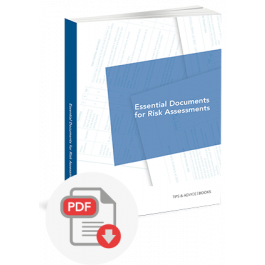Essential Documents for Risk Assessments (PDF)
A Tips & Advice book about...
In a nutshell
This hands-on book helps you carry out effective risk assessments that satisfy all the legal requirements. Use it to keep everyone safe and your business protected, all at a low cost.
In detail
This book shows you what a risk assessment should look like. It's full of forms and guidance that simplify the risk assessment process. For numerous workplace scenarios, it analyses:
- Who's at risk
- What are the significant hazards
- What' is the likelihood, severity and degree of the risk
- Which control measures you can implement
- What is the residual risk after implementing control measures
You can easily customise content to suit your own workplace. Plus, you'll benefit from a complementary online service to immediately put these documents to good use. Handy, user-friendly and quick.
We've created this Tips & Advice book especially for...
Business owners and managers, health and safety staff that want to:
- Cost-effectively manage the risks in their business
- Comply with the current legislation
- Keep everyone safe without cutting corners
Health and safety consultants that want to:
- Have a stack of risk assessments readily available
This new edition has been updated with new documents dealing with…
- Quick risk prediction
- Volunteers
- Working with collaborative robots
- Safe use of circular saws
- Using electric powered pallet trucks
- Ergonomics
- Personal risk
You'll get the following free extras with this Tips & Advice book...
An online service with ready-to-use documents
- To immediately apply our advice and solutions in practice
- That you can easily adapt to suit your own requirements
In this Tips & Advice book you'll read about...
Introduction
Section 1 - Task- based risk assesments
Chapter 1 - Chemicals
COSHH/DSEAR assessment - bleach
COSHH/DSEAR assessment - concrete
COSHH/DSEAR assessment - metalworking fluids
COSHH/DSEAR assessment - petrol and diesel
COSHH/DSEAR assessment - used motor and transmission oil
COSHH/DSEAR assessment record
Handling and storage of chemical substances
Liquid spillages
Preliminary COSHH assessment
Safe use of basic cleaning materials
Storage and handling of flammable liquids
Transporting small quantities of chemicals, paints and solvents
Use and storage of petrol
Work with lubricants and waste oils
Chapter 2 - Construction
Avoidance of buried services
Cabling in underfloor voids
Construction sites (access for visitors)
Cutting and preparing stone
Cutting holes in concrete and brickwork
Drilling asbestos cement sheets
Excavations on construction sites
Ground works - excavations
Insulating lofts with MMMF
Land survey work
Laying paving slabs and kerbs
Maintenance and repair of construction plant
Protecting the public from construction works
PV panel installation
Re-felting a flat roof
Removal of lead-based paints from doors and windows
Replacing a pitched tiled roof
Safe demolition of external walls
Safe erection and dismantling of tubular scaffolding
Safe erection of post and board fencing
Safe handling of scaffolding equipment
Safe tree felling
Safety in bricklaying
Safety in plastering work
Unloading vehicles on a construction site
Use of a bulldozer
Use of a dumper
Use of a mobile excavator
Use of a screener
Working from a fixed scaffold
Chapter 3 - General
Cleaning - general
Fireworks
First aid requirements
Lone working
Manual handling
Manual handling - team lifting
Occupational stress
Pregnant staff
Quick risk prediction
Risk assessment - blank
Risk assessment - guidance
Risk assessment audit
Risk assessment training record
Safety when handling cash
Site-specific risks
Using, collecting and disposing of sharps
Volunteers
Working out of hours
Young persons on work experience
Chapter 4 - Machinery
Cleaning vehicles using a pressure washer
Drilling holes into textured coatings
Machinery (blank)
Machinery maintenance
Replacing a CCTV camera
Safe use of a hand-held masonry saw
Safe use of a single-end tenoning machine
Safe use of angle grinders/cutters
Safe use of chainsaws
Safe use of circular saws
Safe use of electric drills
Safe use of garden equipment
Safe use of hand tools
Safe use of lathes
Safe use of metal cutting guillotines
Safe use of narrow band saws
Safe use of oxy-acetylene welding and cutting equipment
Safe use of pillar and bench mounted drills
Safe use of pneumatic tools
Safe use of pressure washers
Safe use of ride-on mowers
Safe use of roll cages
Safe use of site table saws
Use of a scissor lift
Use of a telehandler
Use of bitumen boilers
Using a floor buffing machine
Using a leaf blower
Using a vertical baling machine
Using bench-mounted abrasive wheels
Using cartridge-operated tools
Using pedestrian-operated pallet trucks
Welding
Working with collaborative robots
Workshop machinery operations
Young persons working in an engineering environment
Chapter 5 - Office
Cleaning business premises
Display screen equipment (DSE) - workstation assessment
Ergonomics
General office duties
General office duties - staff under 18
General operations
Managing slips, trips and falls in an office environment
Office cleaning
Office manual handling
Office storage
Chapter 6 - Transport
Access to vehicles whilst loading/unloading
Changing wheels on vehicles
Charging fork lift truck batteries
Control of third party drivers on company premises
Driving at work
Fork lift truck operations
Loading and unloading of vehicles
Loading goods into cars
Safe management of grey fleet drivers
Safety for delivery drivers of vehicles up to 1,500kg (1.5 tonnes)
Using a non-integrated working platform on a fork lift truck
Using electric powered pallet trucks
Vehicle movements
Winter driving
Working in loading and unloading areas
Chapter 7 - Workplace
Changing electric lamps
Changing electric light fittings
Changing electric socket outlets
Cleaning in kitchens
Cleaning retail premises
Clearing up after a flood
Detailed assessment - lifting and carrying
Detailed assessment - pushing and pulling
Drinking water dispenser
Embalming
External areas
Floor and wall tiling
General building maintenance
General building maintenance above ground level
General maintenance and gardening
Ground clearance
Hazard Analysis Critical Control Points (HACCP)
Holes in floors and excavations
Housekeeping and changing beds
Legionella
Light duties
Manual handling of dead bodies
Mobile tower scaffolds
Noise
Painting and decorating
Plumbing and heating
Podium steps
Public safety
Retail
Safe removal and disposal of small amounts of asbestos-containing materials
Serving and preparing deli food and drink
Serving and preparing hot food
Slinging of loads
Slips, trips and falls
Slips, trips and falls in kitchens
Spray painting emulsion
Stockroom operations
Trees
Unblocking drains and pipes
Use of ladders
Use of stepladders
Using evacuation chairs
Violence against staff
Warehouse operations
Window cleaning
Working at height
Working on fragile roofs
Workplace winter precautions
Section 2 - Location- based risk assesments
Attendance at external events
Bar work
Call centres
Classroom
Garages and workshops
Homeworkers - general
Outdoor event safety plan and risk assessment
Playground
School sports
School trips
Small conferences and seminars
Swimming pools - general
Visiting customer sites
Warehouses (general access for visitors)
Work near water
Working from home (office-based staff)
Working from home (sewing and ironing)
Working in confined spaces
Working in domestic premises
Working in laboratories
Working in LPG storage areas
Working in manholes
Working in plant and equipment rooms
Working in roof spaces
Special subscribers' offer
£90.00
£70.00
Only if you already have a subscriptionStandard offer
£90.00

Got a question? Call Customer Services
(01233) 653500


 (01233) 653500
(01233) 653500 







